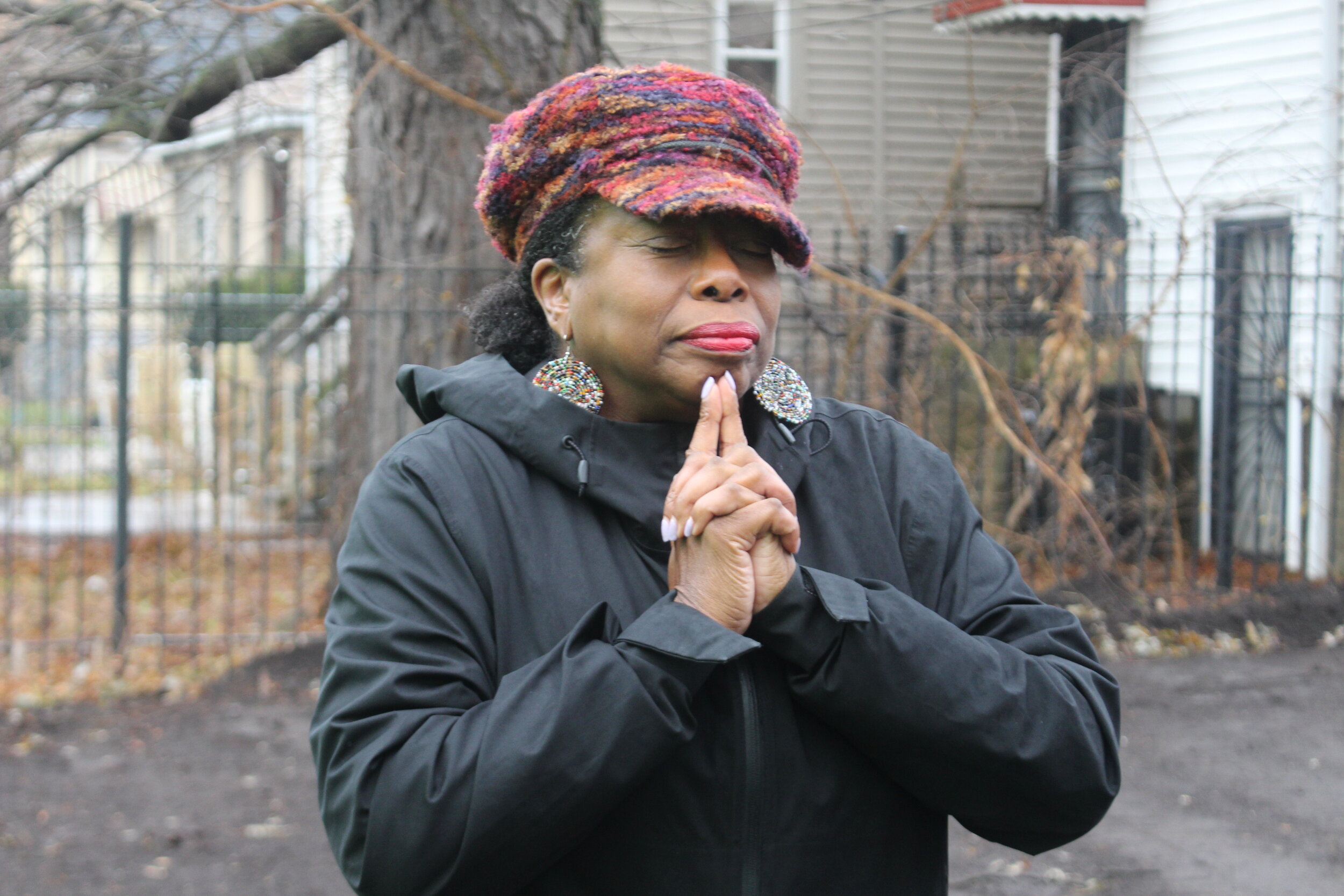New Woodlawn community garden to honor civil rights activist Mamie Till-Mobley and her legacy of forgiveness
This plaque at the Mamie Till-Mobley Forgiveness Garden in West Woodlawn is just one of the features in the space that will honor Mamie Till Mobley. Photo by Maia McDonald
Soon, the Woodlawn neighborhood will be home to a new green space that once work on it is finished, will reflect an effort to heal from decades of racism and pain as well as honor an important figure in black Chicago history - Mamie Till-Mobley, the mother of Emmett Till.
On Saturday, Nov. 30, the community group Blacks In Green held a consecration ceremony to unveil the Mamie Till-Mobley Forgiveness Garden, a new green space located at the northwest corner of E. 64th St. and S. St. Lawrence Ave., and the latest of Blacks In Green’s “16 Great Migration Gardens of West Woodlawn” initiative that will be home to medicinals, aromatics, herbs and, eventually, an onsite Mamie Till-Mobley museum. Other features to come in the spring will be walking paths, “peace niches” and heritage plaques, all to encourage visitors to have quiet moments of reflection.
“We are definitely cultivating a spirit of family here, a spirit of belonging, a spirit of heritage and we want to make sure that everyone understands that this is the humble beginning of something great for this walkable village of West Woodlawn,” said Naomi Davis, the founder of Blacks In Green.
The space was consecrated by the pouring of libations, a ritual in which a liquid is poured to honor a deity or spirit, or the memory of the dead. Libations were poured during the event to honor past ancestors, the divine spirit of the universe and Mamie Till-Mobely herself. Cam Howard, a friend of Davis’ who performed the ritual, made sure to express the importance of pouring libations in the history of black people and the future of the space itself.
“The tradition of libations goes back to our earliest civilizations,” Howard said. “When you look at the tombs or the wall paintings in Egypt, you’ll see them pouring libations to the ancestors. So, there’s no African culture that doesn’t recognize these traditions of pouring libations. And the whole concept behind libations is the universe understanding that there’s a inter-dependence of everything that exists and when you receive from the universe, you should also give back. It’s the concept of reciprocity and so when we pour libations, we’re giving back.”
Blacks In Green founder Naomi Davis during the pouring of libations at the Mamie Till-Mobley Forgiveness Garden Consecration event. Photo by Maia McDonald
The event honoring the mother of slain Chicago teenager Emmett Till, whose 1955 lynching in Money, Miss. launched the American Civil Rights movement, invited community members to reflect on the idea of forgiveness, prompted by Mamie Till-Mobley’s own method of healing from the pain of losing her son. Community members were able to watch as Davis spoke about Till-Mobley as well as the importance of the space they were in, not far from where the Till family actually lived, in the Woodlawn neighborhood. For her, Till-Mobely is a prime candidate for a commemorative garden.
“What was so very new about it was the open declaration of peace that Mamie Till launched her bold commitment to forgiveness, her unwillingness to live in hate and extend perpetration,” Davis said. “And so the idea that someone who lived at 6427 South St. Lawrence, just a few doors down from this garden and whose son actually triggered what’s known as the Civil Rights Movement in America, that someone who made such a profoundly rare stance and contribution in the American story, would not have hallowed ground and deep attention and public respect is unthinkable.”
Till-Mobley, as she later became known after remarrying, often spoke about the power of forgiveness, its impact on her life and how it healed her. The activist and educator struggled greatly with grief following her son’s death, especially after his killers were acquitted for the crime. However, in 2002, at her last public appearance before her death, Till-Mobely talked about an experience where she says God spoke to her, urging her to forgive her son’s killers or the pain and hate would destroy her. This experience is one that changed her life.
“It seemed like someone took a giant eraser and my mind had become a chalkboard and everything...all the memories of Mr. Milam and Mr. Bryant were erased from my thoughts,” Till-Mobley said, only about a month before her death. “I was able to go out into the vineyard and work which I’d been commissioned [by God] to do and that worked turned out to be training boys and girls to Dr. King’s speeches. I can truthfully say that for 47 years, I have not wasted any time hating [J.W.] Milam and [Roy] Bryant. They became inconsequential so far as I was concerned. It was as if they didn’t even exist. And since I have had time to think things over, I don’t want anyone to dead. And even the ones that are proven guilty, and these two men did confess of their foul deed. But even so, I do not wish ill. I don’t have the balance of life and death in my hands. That was entrusted to God himself.”
Till-Mobley’s words were reflected on by Vernon Baptist Church Pastor Andrew Gibson at the event and the strength it took Till-Mobley to live and preach forgiveness.
A young Mamie Till-Mobley with son Emmett Till before his death on Aug. 28, 1955. Photo courtesy of Chicago Sun-Times/AP.
“If you look at her life in 1955, she lost, at that moment, her only son,” said Pastor Andrew Gibson of Vernon Baptist Church, a speaker at the event. “I don’t know how many people can imagine losing your only child and having to forgive the perpetrator. Even on a three-way phone call, the perpetrator said ‘if I had to do it again, I’d do it all over again’ and this woman, Mamie Till, said she forgave that same day. Some people ask how you can forgive someone who’s done something so wrong to you. The fact of the matter is you don’t forgive for them. You forgive for yourself.”
Gibson later urged community members attending the event to find someone they’ve been wronged by and forgive them, saying that the practice could benefit them.
No members of the Till family were able to attend the event. However, according to Davis, they are excited to see the space develop in the future through cultivation, attention and love.




